Unit 5 What were you doing when the rainstorm came?课件 (共118张PPT)
文档属性
| 名称 | Unit 5 What were you doing when the rainstorm came?课件 (共118张PPT) | 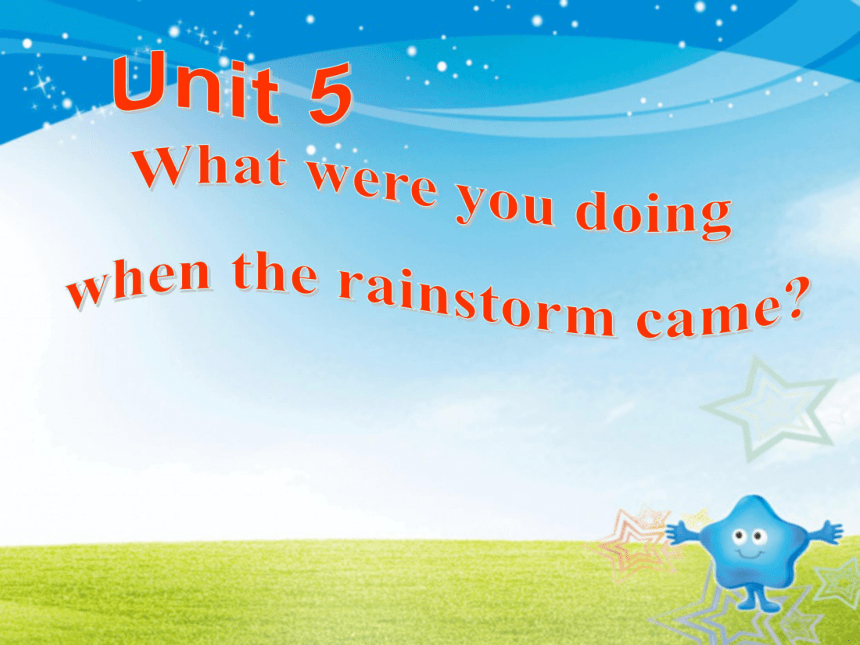 | |
| 格式 | zip | ||
| 文件大小 | 6.9MB | ||
| 资源类型 | 教案 | ||
| 版本资源 | 人教新目标(Go for it)版 | ||
| 科目 | 英语 | ||
| 更新时间 | 2018-04-08 19:33:44 | ||
图片预览

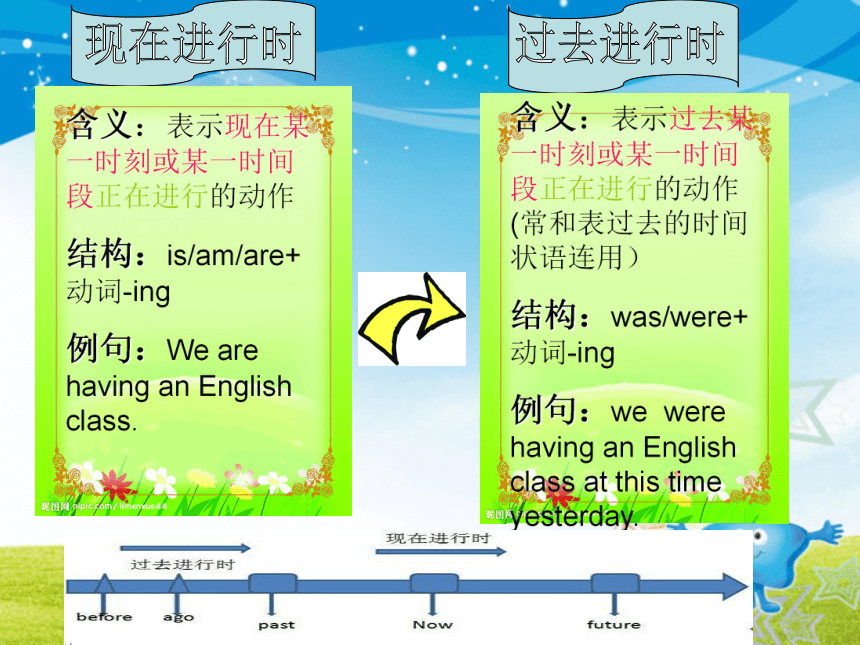
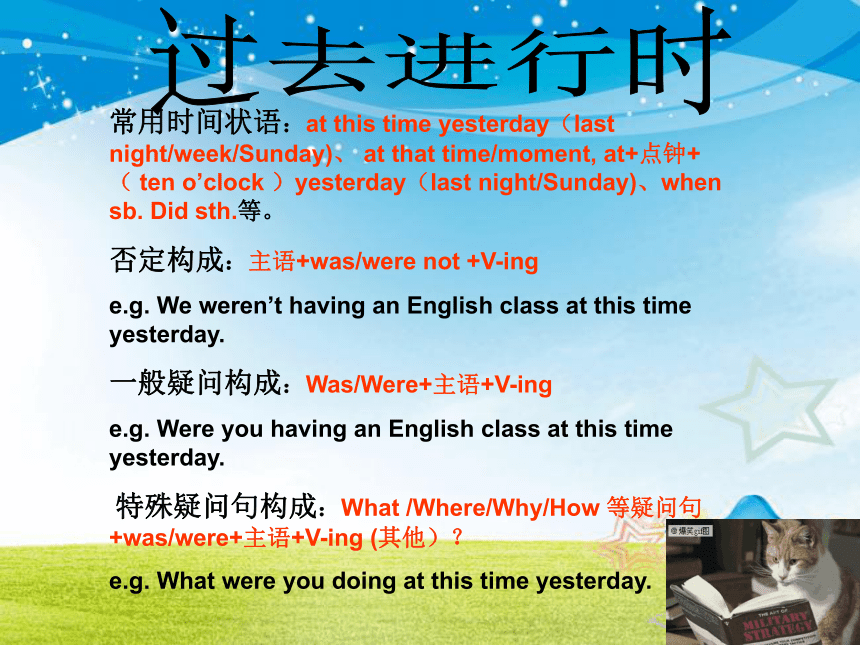
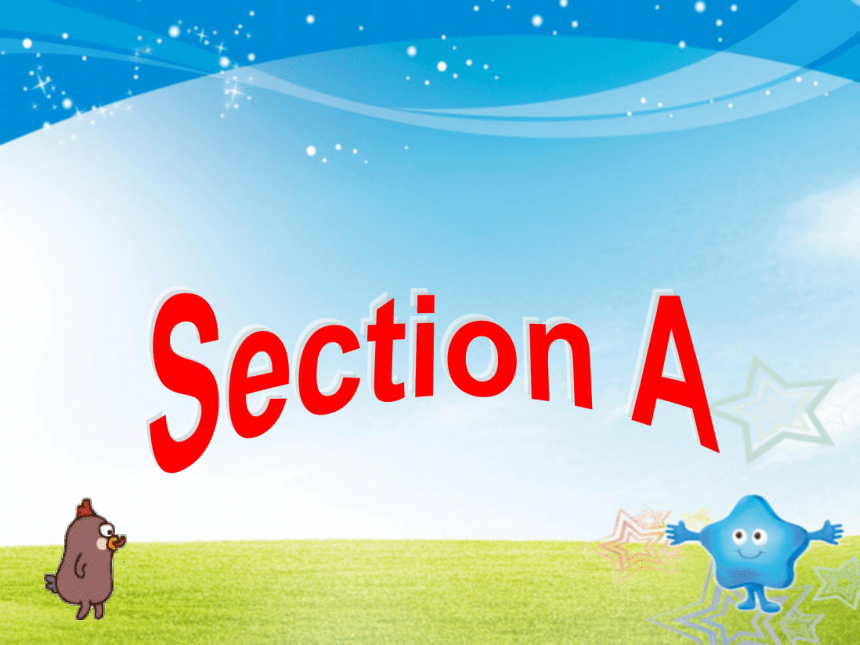
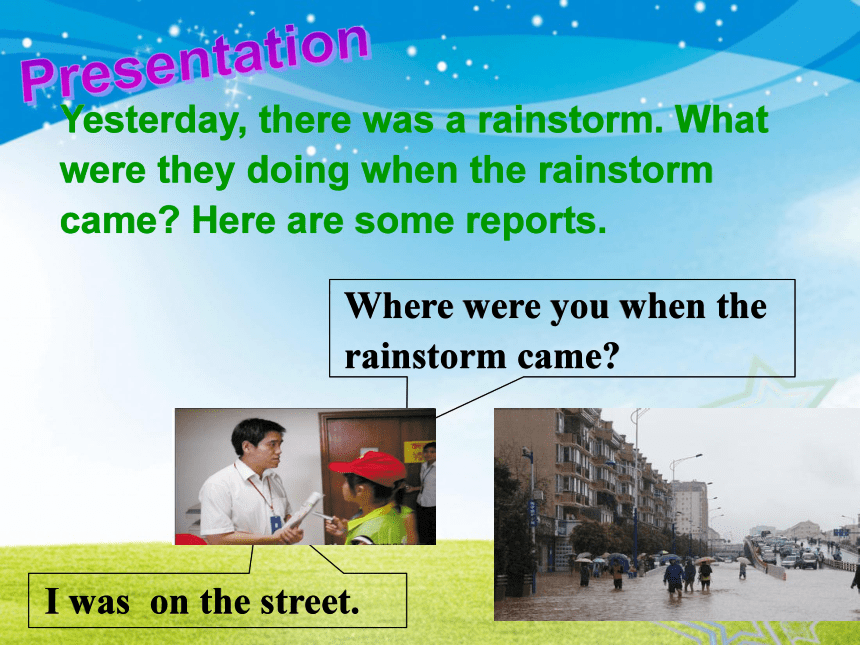

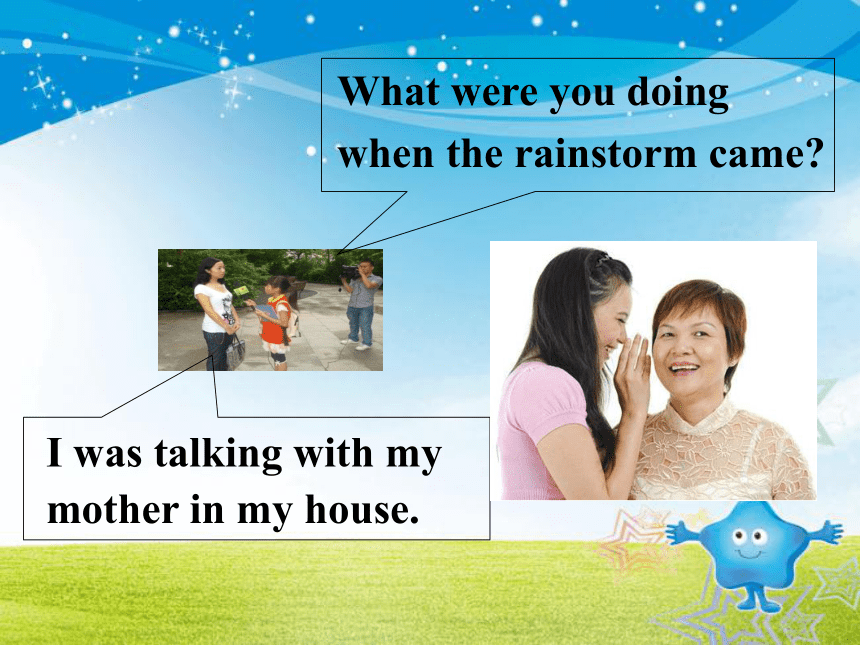
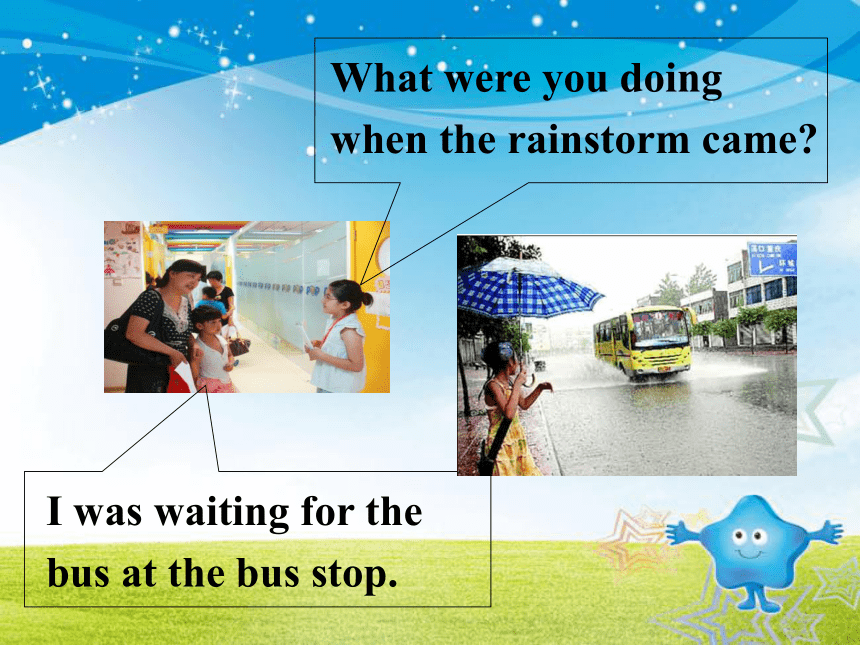
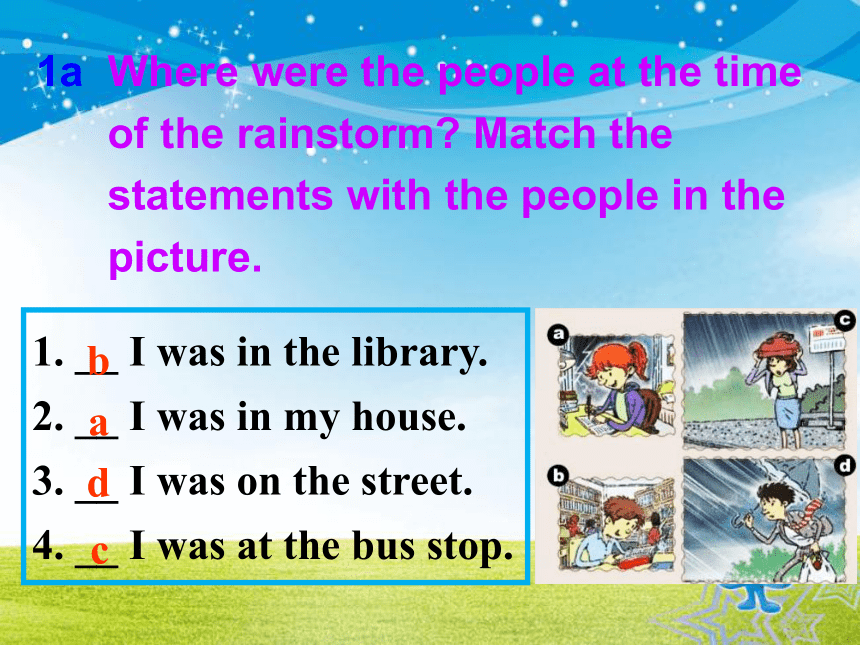

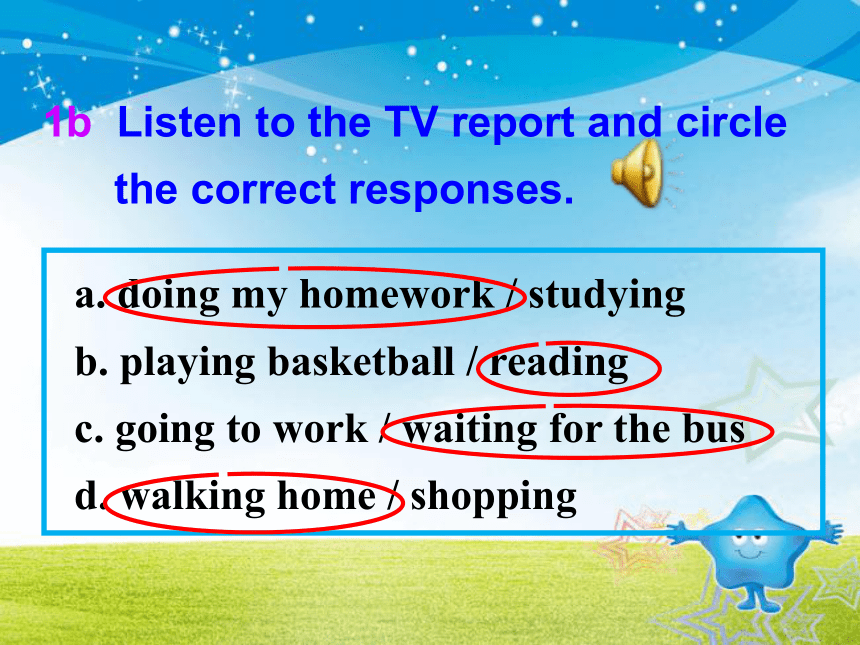
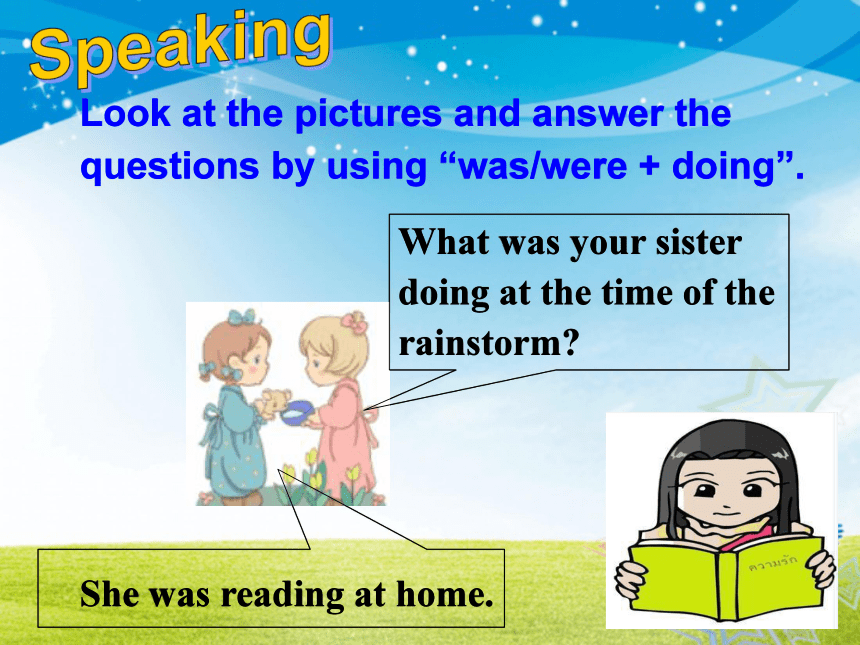
文档简介
课件118张PPT。What were you doing
when the rainstorm came?Unit 5现在进行时过去进行时含义:表示现在某一时刻或某一时间段正在进行的动作
结构:is/am/are+动词-ing
例句:We are having an English class.含义:表示过去某一时刻或某一时间段正在进行的动作(常和表过去的时间状语连用)
结构:was/were+动词-ing
例句:we were having an English class at this time yesterday.过去进行时常用时间状语:at this time yesterday(last night/week/Sunday)、 at that time/moment, at+点钟+( ten o’clock )yesterday(last night/Sunday)、when sb. Did sth.等。
否定构成:主语+was/were not +V-ing
e.g. We weren’t having an English class at this time yesterday.
一般疑问构成:Was/Were+主语+V-ing
e.g. Were you having an English class at this time yesterday.
特殊疑问句构成:What /Where/Why/How 等疑问句+was/were+主语+V-ing (其他)?
e.g. What were you doing at this time yesterday.Section A
I was on the street.Yesterday, there was a rainstorm. What were they doing when the rainstorm came? Here are some reports.Where were you when the rainstorm came?PresentationI was studying in the library.What were you doing when the rainstorm came?I was talking with my mother in my house.What were you doing
when the rainstorm came?I was waiting for the bus at the bus stop.What were you doing
when the rainstorm came?1a Where were the people at the time
of the rainstorm? Match the
statements with the people in the
picture.1. __ I was in the library.
2. __ I was in my house.
3. __ I was on the street.
4. __ I was at the bus stop.bdcaWhat were they doing when
the rainstorm came? Let’s listen.
Pay attention to “was/were +doing”.Listening1b Listen to the TV report and circle
the correct responses. a. doing my homework / studying
b. playing basketball / reading
c. going to work / waiting for the bus
d. walking home / shoppingShe was reading at home.Look at the pictures and answer the
questions by using “was/were + doing”.What was your sister doing at the time of the rainstorm?SpeakingHe _____________________.What was your brother doing
at the time of the rainstorm?was doing his homeworkHe ____________________.What was your father doing
at the time of the rainstorm?was playing basketballWhat was your mother doing at the time of the rainstorm?She ____________________.was shopping1c Talk about what the people in 1a were
doing at the time of the rainstorm.A: What was the girl doing at the time
of the rainstorm?
B: She was…PairworkListening2a Listen and number the pictures 1-5.123452b Listen again. Fill in the blanks
in the sentences in 2a.I ____ so busy _______
for the umbrella that I didn’t see a car coming.My alarm didn’t go off so I _______ up late.I took a hot shower
and _________ some
warm food.waslookingatewokeI ____________ for the bus when it began to rain heavily.I _____ to the bus stop but I still missed the bus.was waitingran1. My alarm didn’t go off so I woke up late.
1)、alarm n. 闹钟
e.g. What time shall I set the alarm
for?
我该把闹钟拨到几点钟响?Language points 2)、go off
1、闹钟响,警报器等突然发出巨响
2、离开,离去
e.g. He went off in a great hurry.
他匆匆离去。
2. I was waiting for the bus when it began to rain heavily.
1) begin v. (began) 开始
e.g. I’ll begin whenever you’re ready.
你什么时候准备好我就开始。
常用的句型:
begin?to?do与begin?doing
一般来说,begin to do和begin doing可
以互换,但在以下三种情况下,用to do。 主语不是指人,而是it等。
如:It began to rain.
begin后接表示心理活动的词。如:begin to know, 还有believe, wonder, think等词。
begin本身是ing形式,为避免重复后接to do。 即:beginning to do2) heavily adv. 在很大程度上;大量地
e.g. moving heavily 吃力地移动
It was raining heavily. 雨下得很大。
rain: verb/下雨
heavy rain>light rain>fine rain
大雨 小雨 毛毛细雨
刮大风:blow strongly2c Use the information in 2a to retell the
story in a conversation between the
boy and a TV reporter.TV reporter: Tell us what happened yesterday
morning.
Boy: …
TV reporter: So, when the rainstorm
suddenly came, what were you doing?
Boy: …Speaking1. What ______ (be) you ______ (do) when he arrived?
2. Jim _____________ (sleep) when I came in.
3.They _____________ (watch) TV at 8:00
yesterday evening.
4. Now he __________ (read) and _________(write). were doing was sleeping were watching is reading writingⅠ. 用所给词的正确形式填空ExerciseⅡ.Fill in the blanks. 1. 上课铃响时, 你在干什么?
What _____ you ______ when the class bell rang?
2. 当我妈妈进来时我正在看书.
I _____ ________ when my mother came in.
3. 昨天晚上十点钟她正在做饭.
She ____ ________ at ten o’clock ______ _______. weredoingwas readingwas cookinglast night2d Role play the conversation.Linda: Oh, I was in the
kitchen helping
my mom.Mary: What were you doing last night,
Linda? I called at seven and
you didn’t pick up.Linda: What was I doing at eight? Oh,
I know. When you called, I was
taking a shower.Mary: I see. I called again at eight and
you didn’t answer then either.Mary: But then I called again at nine.Linda: Oh, I was sleeping
at that time.Mary: So early? That’s strange.Linda: Yeah, I was tired. Why did
you call so many times?Mary: I needed help with my
homework. So while you were
sleeping, I called Jenny and
she helped me.Language points1. I called at seven and you didn’t pick up.
call at
1)、在几点打电话
2)、到……作短暂访问
e.g. They called at Mr .Brown’s office last Thursday.
3)、(车、船等)在……停靠或停留
e.g. The ship doesn’t call at Hongkong.
Call sb.=call sb. up=give sb. a call
pick up(=pick up the phone) 接电话
pick up 还有以下含义:
1) 拾起;抱起??
e.g. The?children?picked?up?many?sea?
shells?at?the?seashore.?? ? 孩子们在海边捡到许多贝壳。?? ? ?? ?The pen is lying on the floor, please pick it up. (代词作宾语放中间)
2) (车、船等)在半路搭人
e.g. The?car?stopped?to?pick?me?up.?? ? 汽车停下来接我。?
?2. That’s strange.
strange adj. 奇特的,奇怪的;
不可思议的
e.g. a strange noise 奇怪的声音
He’s always here; it’s strange you’ve
never met him.
他经常在这,你却没有见过他,真是
不可思议。 Make a survey. Ask your partners
in your group what they were doing
at the following time. Fill in the form
and then give a report.SpeakingReport: Tom was reading.
Peter was shopping…A: What were you doing yesterday at 7:00?
B : I was reading. 写出下列短语。 in the library
at the time of
go to work
wait for the bus
walk home
on the street
play basketball
play the piano 1. 在图书馆
2. 在……的时候
3. 去上班
4. 等公共汽车
5. 走路回家
6. 在街上
7. 打篮球
8. 弹钢琴Summary 根据上下文内容填空。Mary: What ______ you doing last night, Linda?
I called at seven and you didn’t pick ____.
Linda: Oh, I was in the kitchen helping my mom.
Mary: I see. I called _____ at 8 and you didn’t
_______ then either.
Linda: What was I doing at 8? Oh, I know. When
you called, I was ______ a shower.
Mary: But then I called again at 9.
Linda: Oh, I _____ sleeping at that time.
Mary: So early? That’s strange.wereupagainanswertakingwasExercisesLinda: Yeah, I was tired.
Why _____ you call so
many times?Mary: I needed help with my
homework.
So while you were ________, I
called Jenny and she helped me.didsleeping Grammar FocusWhat were you doing when the
rainstorm came?I was taking a shower.I was sleeping.I was cooking.I was cutting hair.I was reading.I was in the bathroom.Where were you when the
rainstorm came?I was in the bedroom.I was in the kitchen.I was in the barber’s chair.I was in the living-room.Grammar FocusWhat was he doing when the rainstorm came?
He was reading in the library when the rainstorm came.What was Ben doing when it began to rain heavily?
When it began to rain, Ben was helping his mom make dinner.What was Jenny doing while Linda was sleeping?
While Linda was sleeping, Jenny was helping Mary with her homework.?? 1. 以when和while引导的时间状语从句1) 延续性动词和非延续性动词
????延续性动词指动作可以延续一段时间, 而不是
瞬间结束。
????如: work、study、drink、eat等。
????非延续性动词指动作极为短暂,瞬间结束。
????如: start、begin、hit、jump、knock等。2) 在本单元中, 出现了以when和while引导的
时间状语从句。
when表示“当……的时候”。从句中既可用延续性
动词, 又可用非延续性动词, 这些动词既可以
表示动作, 又可表示状态。从句中的动作既可
和主句的动作同时发生, 又可在主句的动作之前
或之后发生。如:
????Mary was having dinner when I saw her .
????The boy was still sleeping when his mother got
home yesterday morning .while表示“在……的时候”、“在……期间”。
它强调主句的动作与从句的动作同时发生或
主句的动作发生在从句的动作过程中。While
从句中必须是表示动作或状态的延续性动词。如:
????The weather was fine while we were in Beijing .
????She called while I was out.
如果主句的动作在从句的动作过程中发生,
从句常用进行时。如:
While we were swimming someone stole our clothes .
Don’t talk so loud while others are working.?总结?1) when可指时间点, 又可指时间段, 从句中
可用延续性动词, 也可用非延续性动词。
?2) while总是指一个时间段, 从句中必须用延
续性动词。1. _______ Jennifer was reading a magazine,
his sister was listening to the pop music.
A. While B. When C. What time
2. I was trying to draw a cat on the board
_________ the teacher came in.
A. while B. when C. what time
3. My best friend visited my house while I
_______ dinner in the kitchen.
A. cooked B. cooking C. was cooking练一练A B C 4. ―?When?______ the car ______?
―?In 1885.?
(2007随州市)
A. did; invent????? ?B. was; invented
C. does; invent? D. is; invented
5. Our teacher wants us to be ______?when?we talk with the foreigners.
(06大连中考真题) A. comfortable???? B. unusual???????
?? C. grateful??????? ? D. confident B D 6. — Dick gave me a note?while?I ______ in the
library.? — I guess he made it to say “sorry” to you.
(2007黄冈市)? A. am reading B. was reading? ? ?
C. reads? ? D. will read?? B 2. 过去进行时1. 概念: 表示过去某一时刻或某段时间内正进行的动作。
2. 构成: was/were + 动词现在分词
3. 用法:
a: 表示某一时刻正进行的行为, 与特定的过去时间状
语连用,常见的时间有: at 8 last night, at this time
at that time, at that moment 等
e.g. What were you doing at 10 yesterday morning?
I was writing a letter to my father at that moment.b: 表示过去某段时间内正进行的动作。
e.g. We were building a house last winter.
They were waiting for you yesterday.
否定句和疑问句:
e.g. We were not sleeping at home.
Was he feeling well???3.现在分词的构成1) 一般动词在词尾加-ing, 如go--going。
2) 以不发音字母e结尾的动词, 先去掉e, 再加-ing。
come--coming???make--making?? write--writing
3) 以重读闭音节结尾的动词, 如果末尾以一个
辅音字母结尾, 应先双写这个字母, 再加ing,
x和w结尾的除外。
如: get--getting????swim--swimming?
show--showing??4) 以字母y结尾的单词, 直接加ing。
????如carrying、playing、studying。
5) 以字母ie结尾的动词, 变ie为y, 再加ing。
?? die → dying???????????? lie →lying
6) 以元音字母加e结尾, 或以e结尾, 且e发音的
动词, 直接加- ing。
??? see--seeing????????????be--being4.使用进行时态的注意事项1)一些动词, 如see、hear、love、like、know、
remember; understand、have等表示感情、
知觉和状态的词, 一般不用于进行时态。
2) 在there和here引起的句子中, 常用一般现在
时代替现在进行时。
e.g. Here comes the bus.
?????? There goes the bell.5. 过去进行时和一般过去时的区别1) 过去进行时表示过去正在进行的动作,
而一般过去时则表示一个完整的动作。如:
They were writing letters to their friends last night.
昨晚他们在写信给他们的朋友。
(没有说明信是否写完)
They wrote letters to their friends last night .
?他们昨晚写了信给他们的朋友。
(表达了他们已写好的意思, 整个写的过程已完成)2) 当动作延续较长时间时或表示厌烦、赞美等
感彩时, 常用过去进行时表示。如:
He was thinking more of others than of himself.
他考虑别人的比考虑自己的多。
(表示说话者赞扬的口气)
The boy was always making trouble then .
那时, 他总是惹麻烦。(表示说话者厌烦的口气)过去进行时含义: 表示过去某个时刻
正在进行的动作。
结构:
was/were + doing
例句:
I was having an English
class at this time yesterday. 现在进行时含义: 表示现在
正在进行的动作。
结构:
is/am/are + doing
例句:
I am having an English class. 6. 4a. Look at the table and write sentences
with both while and when.e.g.
While John was taking photos, Mary bought a drink.
John was taking photos when Mary bought a drink.While John was playing the piano, Mary left the house.
John was playing the piano when Mary left the house.While John was shopping, Mary took the car to the car wash.
John was shopping when took the car to the car wash.While John was cleaning his room, Mary turned on the radio.
John was cleaning his room when Mary turned on the radio.4c. What were you doing at these times last
Sunday? Fill in the chart. Then ask your
partner.
A: What were you doing at nine o’clock last
Sunday morning?
B: I was sleeping. How about you?
A: I was doing my homework.
B: You're kidding! Group work What were you doing at … last Sunday?A: What were you doing at nine o’clock
last Sunday?
B: I was running. How about you?
A: I was reading.
B: You’re kidding! v. 欺骗; 戏弄; 开玩笑Section B Revision: when vs. while 这两个词都有“当…的时候”的意思。
when 既可指某一点时间, 也可以指一段时间;
while 强调一段时间, 所以从句的谓语动词常是延续性的。
当 when表示“在某一段时间里” 的意思时, 它可以代替
while, 但while不能代替when.
e.g. When I came home, she was cooking dinner.
当我到家时, 她正在做饭。
When you hang wet clothes near a fire, you will see
steam rising from them.
当你把湿衣服挂在火边时, 你会看到水汽从衣服上升起。1a Think of a time when you were late for or couldn't go to an event. What was the event? What was the reason why you were late or couldn't go? Tell your partner the story.1b. Listen and write short answers to the
questions.What event happened at the school yesterday?
_______________________________________
2. Who missed the event?
_______________________________________
3. Which team won at the event?
______________________________________There was a basketball competition.Kate missed the event.John’s team won.1c. Listen again. Number the events [1-6] in
the order they happened.
______Kate saw a dog by the side of the road. ______Kate got to the bus stop.
______Kate called the Animal Helpline.
______Kate left the house.
______Kate waited for someone to walk by. ______Kate realized her bag was still at home.1234561d. Talk about why Kate missed the school
basketball competition. Student A begins a
sentence with while or when. Student B
completes the sentence.A: When the school basketball competition
started ...
B: When the school basketball competition
started, Kate was still making her way
to school.Pair WorkA: When the school basketball competition
started, what was Kate doing at that time?
B: When the school basketball competition
started, Kate was still making her way
to school.A: While Kate was running back home, what
happened?
B: While Kate was running back home, Kate
saw a dog by the side of the road.Pair WorkWhat do you doing at that time?What do you doing at that time?What do you doing at that time?What do you doing at that time?What do you doing at that time?What do you doing at that time?Do you know this man? What
do you know about him?马丁.路德.金(1929年1月15日—— 1968年4月4日),著名的美国民权运动领袖。1948年大学毕业。1948 年到1951年间,在美国东海岸的费城继续深造。1963年,马丁?路德?金 晋见了肯尼迪总统,要求通过新的民权法,给黑人以平等的权利。
1963年8月28 日在林肯纪念堂前发表 《我有一个梦想》的演说。1964年获得诺贝尔和平奖。1968年4月, 马丁.路德.金前往孟菲斯市领导工人 罢工被人刺杀,年仅39岁。1986年 起美国政府将每年1月的第三个虽期 一作为马丁.路德.金全国纪念日。2a. Look at the pictures and title in the
passage. What do you think the passage
is about?
2b.Read the passage and answer the questions.
1.What are the two events in the passage?
2. When did they happen?Reading the Title and First Sentences
The title can be helpful for you to understand
a text. It is also a good idea to read the first
sentence of each paragraph before you read
the whole text. Do You Remember What You
Were Doing?
People often remember what they were doing when they heard the news of important events in history. In America, for example, many people remember what they were doing on April 4, 1968. This was an important event in
American history. On this day, Dr. Martin Luther King was killed. Although some people may not remember who killed him, they remember what they were doing when they heard the news.Robert Allen is now over 50, but he was a school pupil at that time. “I was at home with my parents,” Robert remembers. “We were eating dinner in the kitchen when we heard the news on the radio. The news reporter said, ‘Dr. King died just 10 minutes ago.’ My parents were completely shocked! My parents did not talk after that, and we finished the rest of our dinner in silence.”
More recently, most Americans remember what they were doing when the World Trade Center in New York was taken down byterrorists. Even the date — September 11, 2001
— has meaning to most Americans.
This was a day Kate Smith will never forget.
She remembers working in her office near the
two towers. “My friend shouted that a plane just hit the World Trade Center! I didn’t believe him at first, but then I looked out the window and realized that it was true. I was so scared that I could hardly think clearly after that.”1.What are the two events in the passage?
2. When did they happen?The first event happened on April 4, 1968,
and the second one happened on September
11, 2001. Dr. Martin Luther King was killed; the World
Trade Center in New York was taken down by
terrorists. 2c. Read the passage again. Are the following
statements true (T) or false (F),or is the
information not given (NG)?
________ 1. Everyone in America remembers who
killed Dr. King.
_____2. Robert Allen was eating lunch when
Dr. King was killed.
_____3. Roberts parents were shocked to hear
the news.FTT_____4. Kate Smith was watching a movie when
a plane hit the World Trade Center.
_____5. Kate didn't think her friend was telling
the truth about the event.NGF1. Not everyone will remember who killed him, but they can remember what they were doing when they heard that he got killed.
2d. Find out sentences from the passage
with similar meanings to the ones below.many people remember what they were doing on April 4, 1968. This was an important event in American history. On this day, Dr. Martin Luther King was killed.2. No one said anything for the rest of dinner.
3. September 11, 2001— the date alone means something to most people in the US.My parents did not talk after that, and we finished the rest of our dinner in silence.”Even the date — September 11, 2001
— has meaning to most Americans.4. I had trouble thinking clearly after that because I was very afraid.I was so scared that I could hardly think
clearly after that.”A: When did Dr. Martin Luther King die?
B: He died on ...2e.How much do you remember about the events in the passage? Test your partner.Pair Work What was the event?
When did it happen?
Where did it happen?
What were you doing?
What were your friends doing?
Why was it important?
Why do you remember this event?3a. Make notes about an event you
remember well. 3b. Write a short article about the important
event in 3a. Try to write three paragraphs.First, write about the event (when and where it happened).
Next, write about what you and some of your friends were doing when this event happened.
Then, write about why this event was important.An important event that I remember well was ___________. It happened in/ on
_________ at/in ________________.
When I heard the news of this event/ When this event happened, I was_______________. My friends were_______________________.
This event is very important to me because _____________. /I remember this event well because ______________________________.Language pointsOn this day, Dr. Martin Luther King was killed.
这一天,马丁 ?路德?金博士遇害了。
1)马丁 ?路德?金(Martin Luther King, Jr., 1929--1968)是世界上知名的美国民权运动领袖。
在20世纪50~60年代,他为改善美国黑人的社会权利及地位做了大量的工作。作为黑人领袖,
他贏得了美国各阶层人民的尊重和爱戴,为世界所关注,1964年荣获“诺贝尔和平奖”。
2)was killed 的意思是“被杀害”,表被动关系。2. …most Americans remember what they were doing when the World Trade Center in New York was taken down by terrorists.
……绝大多数美国人都记得纽约世贸中心被恐怖分子摧毁时他们在做什么。
1)纽约世贸中心
世界贸易中心( World Trade Center )简称
“世贸中心”,是美国纽约的地标之一。2001年
9月11日,世贸中心被恐怖分子用所劫持的民航班撞击摧毁,这就是举世震惊的“9 11事件”。
2)take down 意为“摧毁” 。3. She remembers working in her office near the two towers.
她当时记得自己正在据两座塔楼不远的办公室工作。
1)towers 指世贸中心的双子塔。
2)remember (someone) doing sth 是固定搭配。
表示 “记得某人做过某事”, 其中remember
可表示“记得;回忆起;想起”等意思。如:
I don't remember seeing him anywhere.
我不记得在什么地方见过他。单项选择1. I met a friend of mine _____ I was walking in
the park.
A. before B. when C. after D. if
2. We’ll go for a walk if it _____ tomorrow.
A. will not rain B. isn’t raining
C. doesn’t rain D. isn’t rain
3. I met Li Lei _____ hospital last Sunday.
He was ill _____ hospital then.
A. in the, in the B. in, in the C. in the, in D. in, inB C C 4. When you are _____ trouble, why not phone
the _____?
A. at, police B. in, policeman
C. in, police D. at, policeman
5. ____ useful invention the computer is!
A. What a B. What an C. How a D. How an
C A 6. I can’t find ____ to sit on the crowded bus.
A. nowhere B. somewhere
C. anywhere D. everywhere
7. My mother was cooking while I ____ the radio.
A. listened to B. have listened to
C. was listening to D. is listening to
8. _____ TV at that time?
A. Did you watch B. Have you watched
C. Were you watching D. Are you watchingC C C 9. They arrived ____ Paris ____ a winter evening.
A. at, in B. to, on C. in, on D. in, at
10. Mr. Green told us ____ too much time ____
reading novels.
A. don’t take; on B. not to take; in
C. not to spend; in D. don’t to spend; on
11. Do you know _____?
A. what he happened
B. what the matter is with him.
C. what happened to him
D. what did he happenedC C C 12. The thief _____ the purse and _____.
A. drops, run after B. dropped, ran away
C. dropped, run away D. dropped, ran away
13. People in China are always dressed ______
their best clothes _____ New Year’s Day.
A. at, in B. to, on C. in, on D. in, at
D C 14. —Is Mr. Green really very ill?
— __________ . He's?in?hospital.
(中考真题)
A I don' t think so B No, he isn't
C l hope so D I' m afraid so
15. Her husband is ill _____ (2006 北京市)
A.?in?a?hospital? B.?in?hospital?
C.?in?the?hospital? D. on?the?hospital D B 16. ―My pen is lost and I can’t find
it?anywhere. ―So you will have to buy _________. (中考真题)
A. it B. few C. one D. any C
when the rainstorm came?Unit 5现在进行时过去进行时含义:表示现在某一时刻或某一时间段正在进行的动作
结构:is/am/are+动词-ing
例句:We are having an English class.含义:表示过去某一时刻或某一时间段正在进行的动作(常和表过去的时间状语连用)
结构:was/were+动词-ing
例句:we were having an English class at this time yesterday.过去进行时常用时间状语:at this time yesterday(last night/week/Sunday)、 at that time/moment, at+点钟+( ten o’clock )yesterday(last night/Sunday)、when sb. Did sth.等。
否定构成:主语+was/were not +V-ing
e.g. We weren’t having an English class at this time yesterday.
一般疑问构成:Was/Were+主语+V-ing
e.g. Were you having an English class at this time yesterday.
特殊疑问句构成:What /Where/Why/How 等疑问句+was/were+主语+V-ing (其他)?
e.g. What were you doing at this time yesterday.Section A
I was on the street.Yesterday, there was a rainstorm. What were they doing when the rainstorm came? Here are some reports.Where were you when the rainstorm came?PresentationI was studying in the library.What were you doing when the rainstorm came?I was talking with my mother in my house.What were you doing
when the rainstorm came?I was waiting for the bus at the bus stop.What were you doing
when the rainstorm came?1a Where were the people at the time
of the rainstorm? Match the
statements with the people in the
picture.1. __ I was in the library.
2. __ I was in my house.
3. __ I was on the street.
4. __ I was at the bus stop.bdcaWhat were they doing when
the rainstorm came? Let’s listen.
Pay attention to “was/were +doing”.Listening1b Listen to the TV report and circle
the correct responses. a. doing my homework / studying
b. playing basketball / reading
c. going to work / waiting for the bus
d. walking home / shoppingShe was reading at home.Look at the pictures and answer the
questions by using “was/were + doing”.What was your sister doing at the time of the rainstorm?SpeakingHe _____________________.What was your brother doing
at the time of the rainstorm?was doing his homeworkHe ____________________.What was your father doing
at the time of the rainstorm?was playing basketballWhat was your mother doing at the time of the rainstorm?She ____________________.was shopping1c Talk about what the people in 1a were
doing at the time of the rainstorm.A: What was the girl doing at the time
of the rainstorm?
B: She was…PairworkListening2a Listen and number the pictures 1-5.123452b Listen again. Fill in the blanks
in the sentences in 2a.I ____ so busy _______
for the umbrella that I didn’t see a car coming.My alarm didn’t go off so I _______ up late.I took a hot shower
and _________ some
warm food.waslookingatewokeI ____________ for the bus when it began to rain heavily.I _____ to the bus stop but I still missed the bus.was waitingran1. My alarm didn’t go off so I woke up late.
1)、alarm n. 闹钟
e.g. What time shall I set the alarm
for?
我该把闹钟拨到几点钟响?Language points 2)、go off
1、闹钟响,警报器等突然发出巨响
2、离开,离去
e.g. He went off in a great hurry.
他匆匆离去。
2. I was waiting for the bus when it began to rain heavily.
1) begin v. (began) 开始
e.g. I’ll begin whenever you’re ready.
你什么时候准备好我就开始。
常用的句型:
begin?to?do与begin?doing
一般来说,begin to do和begin doing可
以互换,但在以下三种情况下,用to do。 主语不是指人,而是it等。
如:It began to rain.
begin后接表示心理活动的词。如:begin to know, 还有believe, wonder, think等词。
begin本身是ing形式,为避免重复后接to do。 即:beginning to do2) heavily adv. 在很大程度上;大量地
e.g. moving heavily 吃力地移动
It was raining heavily. 雨下得很大。
rain: verb/下雨
heavy rain>light rain>fine rain
大雨 小雨 毛毛细雨
刮大风:blow strongly2c Use the information in 2a to retell the
story in a conversation between the
boy and a TV reporter.TV reporter: Tell us what happened yesterday
morning.
Boy: …
TV reporter: So, when the rainstorm
suddenly came, what were you doing?
Boy: …Speaking1. What ______ (be) you ______ (do) when he arrived?
2. Jim _____________ (sleep) when I came in.
3.They _____________ (watch) TV at 8:00
yesterday evening.
4. Now he __________ (read) and _________(write). were doing was sleeping were watching is reading writingⅠ. 用所给词的正确形式填空ExerciseⅡ.Fill in the blanks. 1. 上课铃响时, 你在干什么?
What _____ you ______ when the class bell rang?
2. 当我妈妈进来时我正在看书.
I _____ ________ when my mother came in.
3. 昨天晚上十点钟她正在做饭.
She ____ ________ at ten o’clock ______ _______. weredoingwas readingwas cookinglast night2d Role play the conversation.Linda: Oh, I was in the
kitchen helping
my mom.Mary: What were you doing last night,
Linda? I called at seven and
you didn’t pick up.Linda: What was I doing at eight? Oh,
I know. When you called, I was
taking a shower.Mary: I see. I called again at eight and
you didn’t answer then either.Mary: But then I called again at nine.Linda: Oh, I was sleeping
at that time.Mary: So early? That’s strange.Linda: Yeah, I was tired. Why did
you call so many times?Mary: I needed help with my
homework. So while you were
sleeping, I called Jenny and
she helped me.Language points1. I called at seven and you didn’t pick up.
call at
1)、在几点打电话
2)、到……作短暂访问
e.g. They called at Mr .Brown’s office last Thursday.
3)、(车、船等)在……停靠或停留
e.g. The ship doesn’t call at Hongkong.
Call sb.=call sb. up=give sb. a call
pick up(=pick up the phone) 接电话
pick up 还有以下含义:
1) 拾起;抱起??
e.g. The?children?picked?up?many?sea?
shells?at?the?seashore.?? ? 孩子们在海边捡到许多贝壳。?? ? ?? ?The pen is lying on the floor, please pick it up. (代词作宾语放中间)
2) (车、船等)在半路搭人
e.g. The?car?stopped?to?pick?me?up.?? ? 汽车停下来接我。?
?2. That’s strange.
strange adj. 奇特的,奇怪的;
不可思议的
e.g. a strange noise 奇怪的声音
He’s always here; it’s strange you’ve
never met him.
他经常在这,你却没有见过他,真是
不可思议。 Make a survey. Ask your partners
in your group what they were doing
at the following time. Fill in the form
and then give a report.SpeakingReport: Tom was reading.
Peter was shopping…A: What were you doing yesterday at 7:00?
B : I was reading. 写出下列短语。 in the library
at the time of
go to work
wait for the bus
walk home
on the street
play basketball
play the piano 1. 在图书馆
2. 在……的时候
3. 去上班
4. 等公共汽车
5. 走路回家
6. 在街上
7. 打篮球
8. 弹钢琴Summary 根据上下文内容填空。Mary: What ______ you doing last night, Linda?
I called at seven and you didn’t pick ____.
Linda: Oh, I was in the kitchen helping my mom.
Mary: I see. I called _____ at 8 and you didn’t
_______ then either.
Linda: What was I doing at 8? Oh, I know. When
you called, I was ______ a shower.
Mary: But then I called again at 9.
Linda: Oh, I _____ sleeping at that time.
Mary: So early? That’s strange.wereupagainanswertakingwasExercisesLinda: Yeah, I was tired.
Why _____ you call so
many times?Mary: I needed help with my
homework.
So while you were ________, I
called Jenny and she helped me.didsleeping Grammar FocusWhat were you doing when the
rainstorm came?I was taking a shower.I was sleeping.I was cooking.I was cutting hair.I was reading.I was in the bathroom.Where were you when the
rainstorm came?I was in the bedroom.I was in the kitchen.I was in the barber’s chair.I was in the living-room.Grammar FocusWhat was he doing when the rainstorm came?
He was reading in the library when the rainstorm came.What was Ben doing when it began to rain heavily?
When it began to rain, Ben was helping his mom make dinner.What was Jenny doing while Linda was sleeping?
While Linda was sleeping, Jenny was helping Mary with her homework.?? 1. 以when和while引导的时间状语从句1) 延续性动词和非延续性动词
????延续性动词指动作可以延续一段时间, 而不是
瞬间结束。
????如: work、study、drink、eat等。
????非延续性动词指动作极为短暂,瞬间结束。
????如: start、begin、hit、jump、knock等。2) 在本单元中, 出现了以when和while引导的
时间状语从句。
when表示“当……的时候”。从句中既可用延续性
动词, 又可用非延续性动词, 这些动词既可以
表示动作, 又可表示状态。从句中的动作既可
和主句的动作同时发生, 又可在主句的动作之前
或之后发生。如:
????Mary was having dinner when I saw her .
????The boy was still sleeping when his mother got
home yesterday morning .while表示“在……的时候”、“在……期间”。
它强调主句的动作与从句的动作同时发生或
主句的动作发生在从句的动作过程中。While
从句中必须是表示动作或状态的延续性动词。如:
????The weather was fine while we were in Beijing .
????She called while I was out.
如果主句的动作在从句的动作过程中发生,
从句常用进行时。如:
While we were swimming someone stole our clothes .
Don’t talk so loud while others are working.?总结?1) when可指时间点, 又可指时间段, 从句中
可用延续性动词, 也可用非延续性动词。
?2) while总是指一个时间段, 从句中必须用延
续性动词。1. _______ Jennifer was reading a magazine,
his sister was listening to the pop music.
A. While B. When C. What time
2. I was trying to draw a cat on the board
_________ the teacher came in.
A. while B. when C. what time
3. My best friend visited my house while I
_______ dinner in the kitchen.
A. cooked B. cooking C. was cooking练一练A B C 4. ―?When?______ the car ______?
―?In 1885.?
(2007随州市)
A. did; invent????? ?B. was; invented
C. does; invent? D. is; invented
5. Our teacher wants us to be ______?when?we talk with the foreigners.
(06大连中考真题) A. comfortable???? B. unusual???????
?? C. grateful??????? ? D. confident B D 6. — Dick gave me a note?while?I ______ in the
library.? — I guess he made it to say “sorry” to you.
(2007黄冈市)? A. am reading B. was reading? ? ?
C. reads? ? D. will read?? B 2. 过去进行时1. 概念: 表示过去某一时刻或某段时间内正进行的动作。
2. 构成: was/were + 动词现在分词
3. 用法:
a: 表示某一时刻正进行的行为, 与特定的过去时间状
语连用,常见的时间有: at 8 last night, at this time
at that time, at that moment 等
e.g. What were you doing at 10 yesterday morning?
I was writing a letter to my father at that moment.b: 表示过去某段时间内正进行的动作。
e.g. We were building a house last winter.
They were waiting for you yesterday.
否定句和疑问句:
e.g. We were not sleeping at home.
Was he feeling well???3.现在分词的构成1) 一般动词在词尾加-ing, 如go--going。
2) 以不发音字母e结尾的动词, 先去掉e, 再加-ing。
come--coming???make--making?? write--writing
3) 以重读闭音节结尾的动词, 如果末尾以一个
辅音字母结尾, 应先双写这个字母, 再加ing,
x和w结尾的除外。
如: get--getting????swim--swimming?
show--showing??4) 以字母y结尾的单词, 直接加ing。
????如carrying、playing、studying。
5) 以字母ie结尾的动词, 变ie为y, 再加ing。
?? die → dying???????????? lie →lying
6) 以元音字母加e结尾, 或以e结尾, 且e发音的
动词, 直接加- ing。
??? see--seeing????????????be--being4.使用进行时态的注意事项1)一些动词, 如see、hear、love、like、know、
remember; understand、have等表示感情、
知觉和状态的词, 一般不用于进行时态。
2) 在there和here引起的句子中, 常用一般现在
时代替现在进行时。
e.g. Here comes the bus.
?????? There goes the bell.5. 过去进行时和一般过去时的区别1) 过去进行时表示过去正在进行的动作,
而一般过去时则表示一个完整的动作。如:
They were writing letters to their friends last night.
昨晚他们在写信给他们的朋友。
(没有说明信是否写完)
They wrote letters to their friends last night .
?他们昨晚写了信给他们的朋友。
(表达了他们已写好的意思, 整个写的过程已完成)2) 当动作延续较长时间时或表示厌烦、赞美等
感彩时, 常用过去进行时表示。如:
He was thinking more of others than of himself.
他考虑别人的比考虑自己的多。
(表示说话者赞扬的口气)
The boy was always making trouble then .
那时, 他总是惹麻烦。(表示说话者厌烦的口气)过去进行时含义: 表示过去某个时刻
正在进行的动作。
结构:
was/were + doing
例句:
I was having an English
class at this time yesterday. 现在进行时含义: 表示现在
正在进行的动作。
结构:
is/am/are + doing
例句:
I am having an English class. 6. 4a. Look at the table and write sentences
with both while and when.e.g.
While John was taking photos, Mary bought a drink.
John was taking photos when Mary bought a drink.While John was playing the piano, Mary left the house.
John was playing the piano when Mary left the house.While John was shopping, Mary took the car to the car wash.
John was shopping when took the car to the car wash.While John was cleaning his room, Mary turned on the radio.
John was cleaning his room when Mary turned on the radio.4c. What were you doing at these times last
Sunday? Fill in the chart. Then ask your
partner.
A: What were you doing at nine o’clock last
Sunday morning?
B: I was sleeping. How about you?
A: I was doing my homework.
B: You're kidding! Group work What were you doing at … last Sunday?A: What were you doing at nine o’clock
last Sunday?
B: I was running. How about you?
A: I was reading.
B: You’re kidding! v. 欺骗; 戏弄; 开玩笑Section B Revision: when vs. while 这两个词都有“当…的时候”的意思。
when 既可指某一点时间, 也可以指一段时间;
while 强调一段时间, 所以从句的谓语动词常是延续性的。
当 when表示“在某一段时间里” 的意思时, 它可以代替
while, 但while不能代替when.
e.g. When I came home, she was cooking dinner.
当我到家时, 她正在做饭。
When you hang wet clothes near a fire, you will see
steam rising from them.
当你把湿衣服挂在火边时, 你会看到水汽从衣服上升起。1a Think of a time when you were late for or couldn't go to an event. What was the event? What was the reason why you were late or couldn't go? Tell your partner the story.1b. Listen and write short answers to the
questions.What event happened at the school yesterday?
_______________________________________
2. Who missed the event?
_______________________________________
3. Which team won at the event?
______________________________________There was a basketball competition.Kate missed the event.John’s team won.1c. Listen again. Number the events [1-6] in
the order they happened.
______Kate saw a dog by the side of the road. ______Kate got to the bus stop.
______Kate called the Animal Helpline.
______Kate left the house.
______Kate waited for someone to walk by. ______Kate realized her bag was still at home.1234561d. Talk about why Kate missed the school
basketball competition. Student A begins a
sentence with while or when. Student B
completes the sentence.A: When the school basketball competition
started ...
B: When the school basketball competition
started, Kate was still making her way
to school.Pair WorkA: When the school basketball competition
started, what was Kate doing at that time?
B: When the school basketball competition
started, Kate was still making her way
to school.A: While Kate was running back home, what
happened?
B: While Kate was running back home, Kate
saw a dog by the side of the road.Pair WorkWhat do you doing at that time?What do you doing at that time?What do you doing at that time?What do you doing at that time?What do you doing at that time?What do you doing at that time?Do you know this man? What
do you know about him?马丁.路德.金(1929年1月15日—— 1968年4月4日),著名的美国民权运动领袖。1948年大学毕业。1948 年到1951年间,在美国东海岸的费城继续深造。1963年,马丁?路德?金 晋见了肯尼迪总统,要求通过新的民权法,给黑人以平等的权利。
1963年8月28 日在林肯纪念堂前发表 《我有一个梦想》的演说。1964年获得诺贝尔和平奖。1968年4月, 马丁.路德.金前往孟菲斯市领导工人 罢工被人刺杀,年仅39岁。1986年 起美国政府将每年1月的第三个虽期 一作为马丁.路德.金全国纪念日。2a. Look at the pictures and title in the
passage. What do you think the passage
is about?
2b.Read the passage and answer the questions.
1.What are the two events in the passage?
2. When did they happen?Reading the Title and First Sentences
The title can be helpful for you to understand
a text. It is also a good idea to read the first
sentence of each paragraph before you read
the whole text. Do You Remember What You
Were Doing?
People often remember what they were doing when they heard the news of important events in history. In America, for example, many people remember what they were doing on April 4, 1968. This was an important event in
American history. On this day, Dr. Martin Luther King was killed. Although some people may not remember who killed him, they remember what they were doing when they heard the news.Robert Allen is now over 50, but he was a school pupil at that time. “I was at home with my parents,” Robert remembers. “We were eating dinner in the kitchen when we heard the news on the radio. The news reporter said, ‘Dr. King died just 10 minutes ago.’ My parents were completely shocked! My parents did not talk after that, and we finished the rest of our dinner in silence.”
More recently, most Americans remember what they were doing when the World Trade Center in New York was taken down byterrorists. Even the date — September 11, 2001
— has meaning to most Americans.
This was a day Kate Smith will never forget.
She remembers working in her office near the
two towers. “My friend shouted that a plane just hit the World Trade Center! I didn’t believe him at first, but then I looked out the window and realized that it was true. I was so scared that I could hardly think clearly after that.”1.What are the two events in the passage?
2. When did they happen?The first event happened on April 4, 1968,
and the second one happened on September
11, 2001. Dr. Martin Luther King was killed; the World
Trade Center in New York was taken down by
terrorists. 2c. Read the passage again. Are the following
statements true (T) or false (F),or is the
information not given (NG)?
________ 1. Everyone in America remembers who
killed Dr. King.
_____2. Robert Allen was eating lunch when
Dr. King was killed.
_____3. Roberts parents were shocked to hear
the news.FTT_____4. Kate Smith was watching a movie when
a plane hit the World Trade Center.
_____5. Kate didn't think her friend was telling
the truth about the event.NGF1. Not everyone will remember who killed him, but they can remember what they were doing when they heard that he got killed.
2d. Find out sentences from the passage
with similar meanings to the ones below.many people remember what they were doing on April 4, 1968. This was an important event in American history. On this day, Dr. Martin Luther King was killed.2. No one said anything for the rest of dinner.
3. September 11, 2001— the date alone means something to most people in the US.My parents did not talk after that, and we finished the rest of our dinner in silence.”Even the date — September 11, 2001
— has meaning to most Americans.4. I had trouble thinking clearly after that because I was very afraid.I was so scared that I could hardly think
clearly after that.”A: When did Dr. Martin Luther King die?
B: He died on ...2e.How much do you remember about the events in the passage? Test your partner.Pair Work What was the event?
When did it happen?
Where did it happen?
What were you doing?
What were your friends doing?
Why was it important?
Why do you remember this event?3a. Make notes about an event you
remember well. 3b. Write a short article about the important
event in 3a. Try to write three paragraphs.First, write about the event (when and where it happened).
Next, write about what you and some of your friends were doing when this event happened.
Then, write about why this event was important.An important event that I remember well was ___________. It happened in/ on
_________ at/in ________________.
When I heard the news of this event/ When this event happened, I was_______________. My friends were_______________________.
This event is very important to me because _____________. /I remember this event well because ______________________________.Language pointsOn this day, Dr. Martin Luther King was killed.
这一天,马丁 ?路德?金博士遇害了。
1)马丁 ?路德?金(Martin Luther King, Jr., 1929--1968)是世界上知名的美国民权运动领袖。
在20世纪50~60年代,他为改善美国黑人的社会权利及地位做了大量的工作。作为黑人领袖,
他贏得了美国各阶层人民的尊重和爱戴,为世界所关注,1964年荣获“诺贝尔和平奖”。
2)was killed 的意思是“被杀害”,表被动关系。2. …most Americans remember what they were doing when the World Trade Center in New York was taken down by terrorists.
……绝大多数美国人都记得纽约世贸中心被恐怖分子摧毁时他们在做什么。
1)纽约世贸中心
世界贸易中心( World Trade Center )简称
“世贸中心”,是美国纽约的地标之一。2001年
9月11日,世贸中心被恐怖分子用所劫持的民航班撞击摧毁,这就是举世震惊的“9 11事件”。
2)take down 意为“摧毁” 。3. She remembers working in her office near the two towers.
她当时记得自己正在据两座塔楼不远的办公室工作。
1)towers 指世贸中心的双子塔。
2)remember (someone) doing sth 是固定搭配。
表示 “记得某人做过某事”, 其中remember
可表示“记得;回忆起;想起”等意思。如:
I don't remember seeing him anywhere.
我不记得在什么地方见过他。单项选择1. I met a friend of mine _____ I was walking in
the park.
A. before B. when C. after D. if
2. We’ll go for a walk if it _____ tomorrow.
A. will not rain B. isn’t raining
C. doesn’t rain D. isn’t rain
3. I met Li Lei _____ hospital last Sunday.
He was ill _____ hospital then.
A. in the, in the B. in, in the C. in the, in D. in, inB C C 4. When you are _____ trouble, why not phone
the _____?
A. at, police B. in, policeman
C. in, police D. at, policeman
5. ____ useful invention the computer is!
A. What a B. What an C. How a D. How an
C A 6. I can’t find ____ to sit on the crowded bus.
A. nowhere B. somewhere
C. anywhere D. everywhere
7. My mother was cooking while I ____ the radio.
A. listened to B. have listened to
C. was listening to D. is listening to
8. _____ TV at that time?
A. Did you watch B. Have you watched
C. Were you watching D. Are you watchingC C C 9. They arrived ____ Paris ____ a winter evening.
A. at, in B. to, on C. in, on D. in, at
10. Mr. Green told us ____ too much time ____
reading novels.
A. don’t take; on B. not to take; in
C. not to spend; in D. don’t to spend; on
11. Do you know _____?
A. what he happened
B. what the matter is with him.
C. what happened to him
D. what did he happenedC C C 12. The thief _____ the purse and _____.
A. drops, run after B. dropped, ran away
C. dropped, run away D. dropped, ran away
13. People in China are always dressed ______
their best clothes _____ New Year’s Day.
A. at, in B. to, on C. in, on D. in, at
D C 14. —Is Mr. Green really very ill?
— __________ . He's?in?hospital.
(中考真题)
A I don' t think so B No, he isn't
C l hope so D I' m afraid so
15. Her husband is ill _____ (2006 北京市)
A.?in?a?hospital? B.?in?hospital?
C.?in?the?hospital? D. on?the?hospital D B 16. ―My pen is lost and I can’t find
it?anywhere. ―So you will have to buy _________. (中考真题)
A. it B. few C. one D. any C
同课章节目录
- Unit 1 What's the matter?
- Section A
- Section B
- Unit 2 I'll help to clean up the city parks.
- Section A
- Section B
- Unit 3 Could you please clean your room?
- Section A
- Section B
- Unit 4 Why don't you talk to your parents?
- Section A
- Section B
- Unit 5 What were you doing when the rainstorm came
- Section A
- Section B
- Review of Units 1-5
- Unit 6 An old man tried to move the mountains.
- Section A
- Section B
- Unit 7 What's the highest mountain in the world?
- Section A
- Section B
- Unit 8 Have you read Treasure Island yet?
- Section A
- Section B
- Unit 9 Have you ever been to a museum?
- Section A
- Section B
- Unit 10 I've had this bike for three years.
- Section A
- Section B
